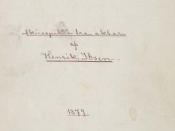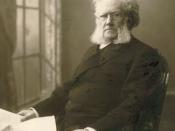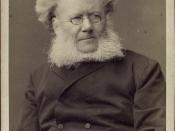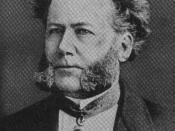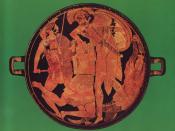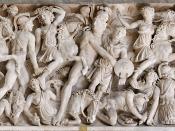In Cassandra and A DollÃÂs House, both Christa Wolf and Henrik Ibsen express their feelings of the socio-economic status of women through the characters of Penthesilea and Nora Helmer. In addition, the authors put their characters in situations where their socio-economic status as being women is challenged.
Christa Wolf uses the Trojan War to show womenÃÂs role in society. During the war, women are not allowed to give any input such as suggestions and opinions about the war, so they become extremely vulnerable, and slaves to the men because they are afraid of what might happen. However, Penthesilea, a man-warrior and independent woman, is not perturbed to show her independence. ÃÂ Her every appearance, her every sentence, was a challenge to someone. She was not looking for allies among us. She was not merely fighting the Greeks; she was fighting all men. I saw that Priam was afraid of her, and Eumelos surrounded her with a thick security cordonÃÂ (117).
The only way Penthesilea can show her independence is by diverging the fantasies of men, which is that women lack the ability to take on a manÃÂs job. Therefore, Penthesilea changes her appearance to intimidate and show the men that she does not have to oblige to their rules. Another situation where Penthesilea shows her independence is during the altercation between her and Achilles. ÃÂHe began to play with herÃÂ The fact that she forced him to take her seriously was her last triumphÃÂ . He threw her down, wanted to take her captive; she scratched him with her dagger and forced him to kill herÃÂ (120). Achilles thought he could take advantage of Penthesilea because she is a woman, which meant she is weak. However, Penthesilea was determined not to become a slave, so she continued to defend herself. This makes Achilles embarrassed, so he decides to kill her to show he is still in power.
Henrik Ibsen uses the socio-economic classes to show womenÃÂs role in society. Mrs. Linde, NoraÃÂs friend, who is less fortunate than her, gave up Krogstad to take care of her mother and two brothers. NoraÃÂs nanny, who is considered the working class, gave up her daughter to find a way of living. Although, Nora is economically advantaged, she fails to follow in the footsteps of the other women and instead let society continue to dictate that the man is the dominant partner of the marriage and women lack the ability to survive on their own. For example, Nora allows Torvald to call her childish animal nicknames,ÃÂ Is that my little skylark twittering out thereÃÂ(148). This dehumanization evokes NoraÃÂs helplessness and dependence of Torvald. In addition, NoraÃÂs actions ratify the stereotype of women being defenseless and easy to be taken advantage of. Another way Nora confirms the truth of the stereotype is by her womanish traits of asking for money and spending it on materialistic items. ÃÂCome in here, Torvald, and you can see what IÃÂve boughtÃÂ But, Torvald, surely this year we can let ourselves go just a little bitÃÂ ÃÂ (148). Once again, Nora becomes dependent of Torvald by asking for money. This warms TorvaldÃÂs heart because he knows that he has control and Nora cannot live without his company.
The women in the stories are in the same situation, they are women and are not treated with respect, but they react differently. Although Penthesilea is forbidden to have independence and to show her independence, she does everything in her might, even risking her life, to make sure women were not seen as susceptible creatures. On the other hand, Nora had a chance to show her independence but she let Torvald take advantage of her and dominant her life. However, when Nora does find her independence, she cowardly did it by walking out on Torvald and kids, while Penthesilea bravely got herself killed, which set a path for the other man-warriors because they admire her victory, independence.
In conclusion, both of the authorsÃÂ perspectives of womenÃÂs socio-economic statuses are the same, whether it is in a classless society or not. The authors show that in menÃÂs perspectives, women are always going to be vulnerable, sensitive, and easily to take advantage of.
Bibliography- Cassandra by Chrysta Wolf- A Doll's House by Henrik Ibsen
